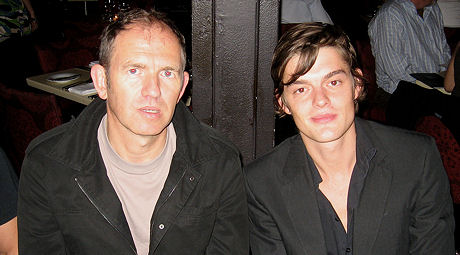The Assassination of Jesse James by the Coward Robert Ford “is like an extended death ballad, an account of the final days of the famed Missouri desperado and ex-Confederate Jesse James that manages to breathe vitality into the western movie as a popular art form at the same time that it so magisterially administers the last rites. To a genre that’s itself been pronounced deceased more times than James’s death has been dramatized, we may have to make room in the tomb for another classic.” — from Geoff Pevere‘s 9.8.07 Toronto Star review.
Month: September 2007
“Atonement” is a Best Picture contender
You can absolutely confirm and take to the bank all serious notions of Joe Wright‘s Atonement (Focus Features, 10.12) being a top-ranked Best Picture contender. It’s a shatteringly well-made, deeply felt, rich-aroma romance that will go all the way with (almost all) critics, Academy voters and public alike.
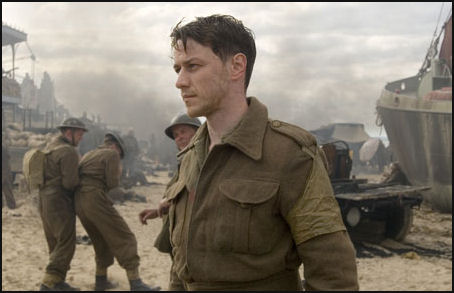
Wright has totally pole-vaulted himself past the level of Pride and Prejudice (a well-made Jane Austen-er that I was only okay with) and taken costars Keira Knightley, James McAvoy and especially Vanessa Redgrave (a locked Best Supporting Actress contender) right along with him.
You can add Focus Features and everyone else associated with Atonement (young Irish actress Saoirse Ronanas, cinematographer Seamus McGarvey, production designers Jacqueline Durran and Sarah Greenwood) as well. Everybody wins with this film, the audience first and foremost.
This is one of those bulls-eye period dramas that feels wonderfully sharp and literate and authentic with emotional tone-perfect performances, and yet the profundity of the payoff is in the way it combines cinematography, editing and sound effects (not to mention one of the most enjoyably splendid uncut Steadicam shots in cinema history — the kind that warrants applause in and of itself) to create a sort of cinematic maelstrom effect.
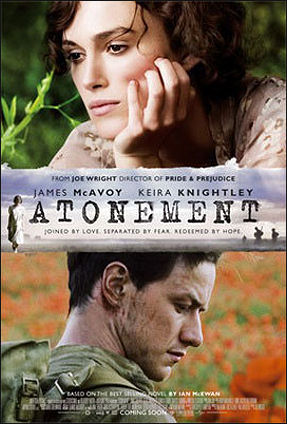
Atonement leaves you with a sense of great regret and sadness (the feel-good kind) that amounts to something much deeper and fuller than what may be suggested by a casual reading of the plotline — a tale about a woman writer crushed by profound guilt over a harmful thing she did as a youth, caused by foolishness that was amplified by sexual panic. Atonement taps into feelings of regret about all things, about how sadly transitional and here-today-gone-tomorrow so much of life is, and injects them into your system like it came from a syringe.
I’m sorry for having suspected that Variety’s Derek Elley was perhaps being just a tad gung-ho-Britain in his Venice Film Festival review (he wasn’t), I now feel that a piece I wrote two years ago about Knightley not having “it” is out of date (Atonement shows that she’s found it and then some since, and without resorting to any of her old tricks) , and I’m sorry for having taken a cheap shot at McAvoy also. I’ve seen the light and am trying to make up as best I can.
Based upon an Ian McEwan novel published in ’01, Wright’s incredibly well-configured adaptation may not entangle younger males as much as other demos, but it’s an absolute slam dunk with mature viewers, couples and over-30 women.
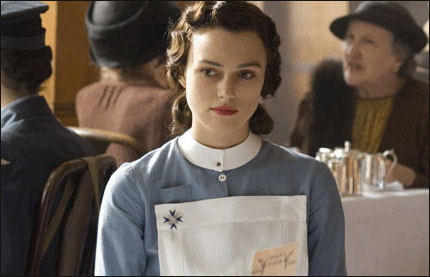
It feels wrong to describe Atonement as a film with three acts, although it is that, because it doesn’t feel defined by “acts” as much as the way Wright has cut it all together, and I mean with not only dazzle but ultra-fine precision. It replays or refrains certain scenes and does flash-forwards and flashbacks with impugnity, and never once does it feel gimmicky for doing so. It all fits together and hums like Swiss machinery.
I can write more about it down the road, including the plot particulars. I have to get to another screening, and I’m late as it is. There’s no getting to even half of what you’d like to get to at this festival. So much of it is about curses and lost opportunities. I love it, of course.
I’m not saying Atonement is necessarily “the one” (I’m hardly in a position to say anything like that), but unless I’m crazy it will almost certainly end up as one of the five Best Picture nominees. And hail to the great Vanessa Redgrave once again. She’s on-screen at the very end for maybe six or seven minutes (perhaps a touch more), and does nothing except talk to an off-screen interviewer, and she hits an absolute grand slam.
“Elizabeth: The Golden Age”
You can forget any serious notions right now of Elizabeth: The Golden Age (Universal, 10.12) being a Best Picture contender. I’m not in the least bit sorry to be the bearer of dispiriting news for the Universal team because this film is an affront to the lost art of story-telling, to logic and clarity, to the tradition of historical costume epics and to God Herself.
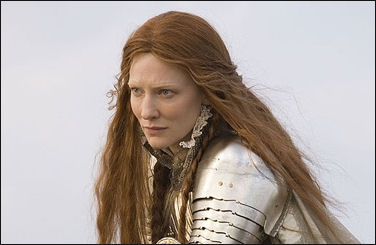
I have been to the temple of madness this morning. I have tasted true lunacy. I feel as I’ve been injected with bad mescaline against my will, and that I need to be taken to the nearest hospital in an ambulance. I have seen Cate Blanchett in silver body armor atop a mighty steed and giving a St. Crispin’s Day speech and wearing a long red “war” wig and wondered, “What’s happening here? Is it me or the movie, or should I just take the elevator up to the roof and jump off?”
This is the kind of wretched, at times laughably mudddled historical epic that makes you say to yourself over and over, “Wikipedia’s Elizabeth page will save me, Wikipedia will save me…thank God for Wikipedia!”
Director Shekhar Kapur has delivered a big canvas super-movie that is entirely (surprise!) about the delivery of wow visual elements — costumes, sets, thousands of candles, wigs, more costumes, courtly elites in dapper gowns and well-trimmed beards — and is borderline ludicrous in just about every other department.
Elizabeth: The Golden Age delivers the kind of hammy overwrought insanity that makes Peter Jackson‘s Lord fo the Rings trilogy look like a model of erudition and old-school restraint. It’s the kind of film that makes you want to run out into the street, screaming and hyperventilating and wildly searching for a valium, a drink, a suppository…anything that might provide a measure of relaxation. I chuckled, I howled once or twice, I wanted to cry, and I was open-mouthed with astonishment.
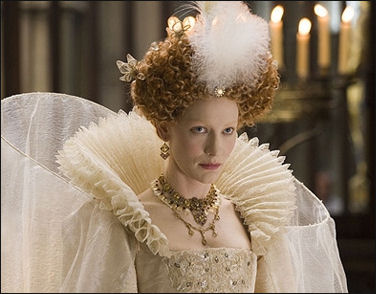
Poor Cate, poor Clive Owen, poor Geoffrey Rush…they must have had a rough idea what they were getting into (Kapur’s first Elizabeth movie was insane also), but this is the kind of thing that just tips over like a huge kettle of gumbo on the floor, soaking everyone’s shoes and sending bypassers scampering.
I’m guessing that Elizabeth: The Golden Age is going to be very, very popular with a certain type of moviegoer and a certain type of critic. It’s definitely a ride and a swim in a pool of fire, but the old “you’ll have to check your brain at the door” maxim doesn’t come close to addressing the situation.
The central conflict of the story is between Spain and the madness that was Catholicism — somewhat akin to the fundamentalist Islamics of today — and Elizabeth’s England. I’d like to explain further but I have to go upstairs and catch Joe Wright‘s Atonement, which is starting in 20 minutes. Talk about states of post-psychedlic, faux-operatic frenzy.
I need to calm down. I need a cup of coffee. I need a Jamba Juice. I need the warm embrace of a friend.
“No Country” party pics
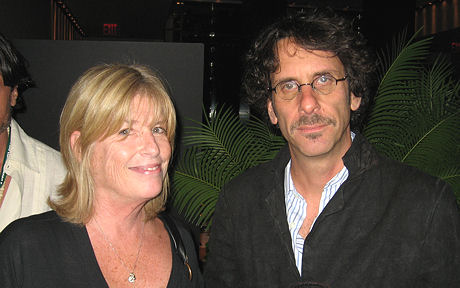
Publicist Claudia Gray, No Country for Old Men director/co-writer Joel Coen at last night’s Old Men party that followed a public screening at the historic Elgin theatre — Saturday, 9.8.07, 8:25 pm. Coen said Skywalker — i.e., George Lucas’s post-production facility in Marin County — has been the highest-quality screening room he’s seen No Country in.
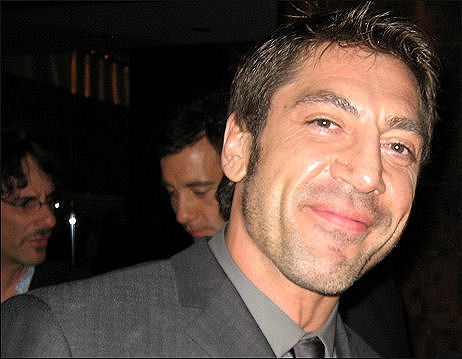
Ultimate No Country badass Javier Bardem at same No Country for Old Men party…”We are all lucky,” he said, evidently feeling that way and then some — Saturday, 9.8.07, 8:40 pm
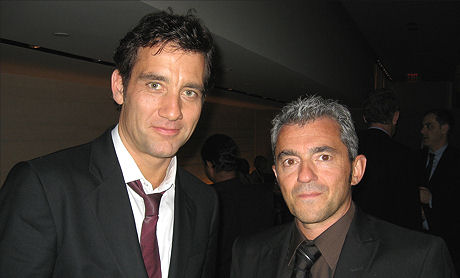
Clive Owen, Miramax chief Daniel Battsek at same gathering. Own sat directly behind me at Elgin screening, and laughed often.
“Into The Wild”
I saw Sean Penn‘s Into The Wild at a special early screening on the Paramount lot several weeks ago, and came away impressed and stirred up. This is an essential “trip” movie — you can’t be any kind of film lover and wait for the DVD — as well as an experience that’s certain to provoke primal passions and arguments. And in terms of focus, passion and visual splendor, it’s easily Sean Penn‘s best-directed film — evidence of serious artistic growth on his part.
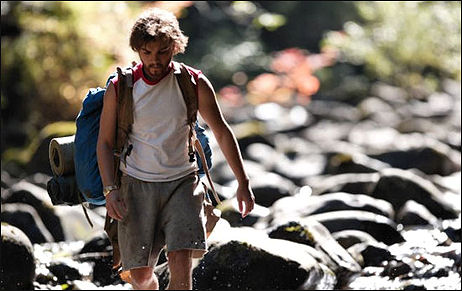
It also contains the best performance Emile Hirsch (Alpha Dog, The Girl Next Door) has ever given, even though, truth be told, he’s not the most charismatic of actors. There’s something vaguely feral and muskratty (and even, at times, other-planet-y) about Hirsch. And yet this quality works for Wild and Hirsch’s strange, quiet performance as a misanthropic loner, especially as he seems to uncover every last shade and mood of misanthropic loner-ism there is.
Everyone presumably knows that Penn’s film is the story of Chris McCandless, the idealistic/disaffected son of privelege who died of starvation in 1992 while trying to be Jeremiah Johnson in the Alaskan wilderness, and that it’s based upon a respected and popular book by Jon Krakauer that covered McCandless’s life and death.
The fact that Into The Wild is a very fully felt spiritual journey stems from Penn obviously being a major believer in the McCandless legend. It’s also a wide-open atmosphere movie about the wonders of nature’s grand cathedral, and this seems especially welcome in this day and age when 99% of the population lives inside artificial environments.
But when you boil the spiritual and visual snow out of it, Wild is about a very self-absorbed, somewhat arrogant, not-exactly-genius-level guy who could have found his way out of the Alaskan wilderness area he died in if he’d thought to buy a decent map. I read an opinion piece by an Alaska forest ranger that clarified my suspicions.
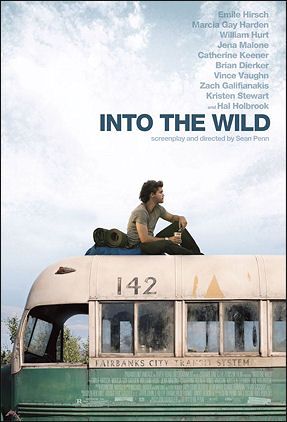
McCandless’s dream — to live a primal life free of meaningless, spirit-draining crap — is something we can all relate to or at least understand, but I’m not sure that Penn’s mostly sympathetic portrait of McCandless (although Into The Wild doesn’t shove anything down yoru throat — it lets you come to your own conclusions) is the entire truth of the matter. I don’t think McCandless took nature quite seriously enough (if he hadn’t found that abandoned school bus he probably would have been dead a lot sooner), and that he wound up paying the price.
I respect that Penn has made a longish film — it’s something like 2 hours and 25 minutes — and that he gives it a kind of drifting, wandering feeling, like you’re wandering through the Louvre only more so. This was the right way to go for a film with this subject and story. And the ending definitely works — you can actually feel a sense of release in the death of a twenty-something guy, which is quite a feat when you think about it. And I agree with everyone else about Hal Holbrook giving an award-quality performance as a kindly old guy whom McCandless/Hirsch meets toward the end of the film.
I’ve other questions and comments, but I have to jam. To be continued….
Venice Film Festival awards
Ang Lee‘s Lust, Caution, which I was respectful of (if not entirely over the moon about) after seeing it Friday, was handed the Venice Film Festival’s Golden Lion trophy two or three hours ago. Rodrigo Prieto‘s cinematography for Lee’s film also won a festival award. The festival’s Silver Lion for Best Director went to Brian De Palma for Redacted (hey, Chris Willman…any reactions?). A special jury prize went to Todd Haynes‘ I’m Not There and Abdellatif Kechiche‘s La Graine et le mulet. Cate Blanchett was named Best Actress for her role in Haynes’ I’m Not There (for playing Blonde on Blonde-era Bob Dylan), and Brad Pitt was named Best Actor in Andrew Dominik’s The Assassination of Jesse James By The Coward Robert Ford.
“Then She Found Me,” “The Visitor” action
The Hollywood Reporter‘s Gregg Goldstein reported two or three hours ago that Helen Hunt‘s Then She Found Me, which she’s both directed and starred in, has been acquired by ThinkFilm and Equinoxe Films (the latter being a Canadian distrib) sometime this morning for a fee in the region of $2.5 to $3 million.
A romantic comedy, And Then She Found Me is about a teacher (Hunt) who is tracked down by her biological mom (Bette Midler) just as her adoptive mother has died, her husband (Matthew Broderick) has left her and as a relationship with a new guy (Colin Firth) is starting to happen. Honestly…doesn’t a movie directed by a woman called And Then She Found Me sound like it could be about something else?
And buyers are also sniffing around Tom McCarthy‘s drama The Visitor, the Saturday morning press screening for which I didn’t attend because I was seeing David Cronenberg‘s Eastern Promises. There was a furtive screening of it last night, apparently.
Saturday numbers
Fantasy Moguls’ Steve Mason is predicting a $15 million-plus tally for 3:10 to Yuma this weekend, but I’m hearing it’ll make closer to $13 or $14 million.
Yuma could have crested $20 million but “the perception of Russell Crowe ever since he threw that phone is that he’s a thug,” a marketing guy contended this morning. “Women don’t want to see him anymore.” Maybe, but he’s a quality-minded thug, I replied, and people trust in the fact that he doesn’t do crap. (A Good Year, I felt, was a nicely made, reasonably decent change-of-life film.)
The second-place Halloween is off 65% and looking at $9,417,000. Superbad will come in third with $7,611,00, which will put it over the $100 million mark. And poor, insufficiently-loved Shoot ‘Em Up — a better ride movie and a more complete film according to its own terms than Yuma is — will come in fourth with a piddly-ass $5.7 million, or about $2700 a print. (I’m sorry to be the bearer but that’s all she wrote — it’s finished — everyone raise a glass to Russell Schwartz‘s final marketing failure for New Line — it shouldn’t have gone up against Yuma.)
The Bourne Ultimatum will come in fifth with $5,553,000. Balls of Fury will be sixth with $5,500,000. Rush Hour 3 will be seventh with $4,050,000, The Nanny Diaries will be eighth with $3,092,000, Mr. Bean’s Holiday will come in ninth with $2,900,000 and Stardust will be tenth with $1,700,000.
“Charlie Wilson’s War” quotes
I’ve had a copy of Aaron Sorkin‘s Charlie Wilson’s War screenplay on my desktop for months, but I wasn’t going to run any portions (if at all) until later in the year. It’s a good script — good enough to make me feel optimistic about this Mike Nichols-Tom Hanks-Phillip Seymour Hoffman-Julia Roberts political dramedy, which doesn’t open until 12.25.07 — but there’s plenty of time to run anticipatory warm-up pieces.
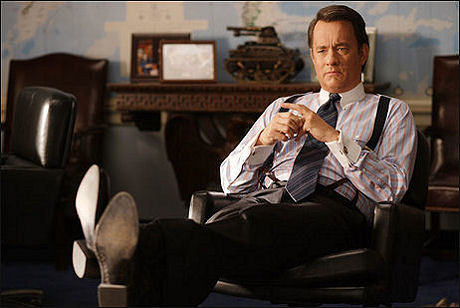
Now comes an AICN review/reaction of a Charlie Wilson’s War research screening by a guy named “PENNENINK.” It’s a 90% positive piece with three samples of Sorkin’s dialogue. Sample #1 (spoken by Hoffman’s character: “I’d like to hold a meeting to review the ten different ways in which you’re a douchebag.” Sample #2: asked why Texas Congressman Charlie Wilson (Hanks) only uses big-breasted women as his secretaries, a woman in his office answers: “Mr. Wilson has a saying — you can teach a girl to type but you can’t teach her to grow tits.” Sample #3: Wilson, reflecting on U.S policies in the Middle East and elsewhere, says at the end that “as usual, we come in [to a country], change the politics and leave. But you know what? That ball? It keeps bouncing…even after we’ve left.”
Hey, how come an early Charlie Wilson’s War teaser-trailer hasn’t made the rounds? The movie opens 14 weeks from now — a flick of an eyelash — and there’s not even a bare-bones website up yet. Universal’s strategy seems to be to just stretch out in the hayloft and wait it out — i.e., create anticipation by doing nothing — and then blast ouf of the barn and throttle up the engine starting in (I’m guessing) mid to late November.
The big question, of course, isn’t whether or not the public will take to this movie, but what will Variety‘s Robert Koehler have to say? As Koehler goes, so goes the too-hip-for-words, inbred-cineaste clique…and if this crowd is against you, they can interrupt or at least interfere with awards-talk momentum. Just a thought.
“Control” dinner
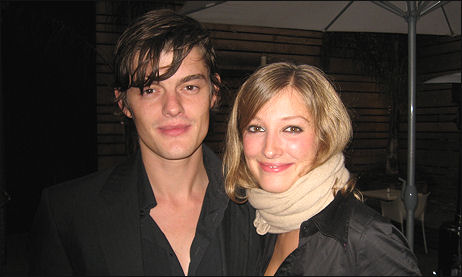
Control stars Sam Riley, Alexandra Maria Lara prior to smallish dinner party at Ultra on Toronto’s Queen Street (also attended by Toronto Star critic Peter Howell, Daily Mail columnist Baz Bamigboye) — Friday, 9.7.067, 7:20 pm
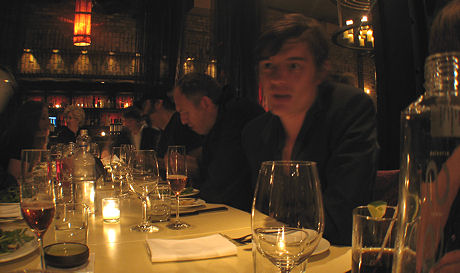
Control au natural…a bad photo in most respects, but the light at the table was beautiful — I had to try to capture at least a fragment of it — Friday, 9.7.07, 7:55 pm
Stolen “Sweeney” music
HE reader Dan Gaertner grabbed some Tim Burton/Sweeney Todd music off the official website when they tested it for about three minutes this morning. The clip, he says, is missing a “huge bell “in the beginning, which I presume means some kind of big Notre Dame-like Sunday morning goohhhnng.
“There Will Be Blood” trailer
There’s a fairly legit-looking full trailer for Paul Thomas Anderson‘s There Will Be Blood (Paramount Vantage, 12.26) on MySpace.com. They’re calling it an exclusive. If it’s not an official trailer, it’s a pretty good rip-off of one by somebody with talent and access to the materials. Love watching Daniel Day Lewis in every clip…an endlessly fascinating actor. You can tell Paul Dano, portraying a religious wackjob type, is going to be intense, but then he always is.

